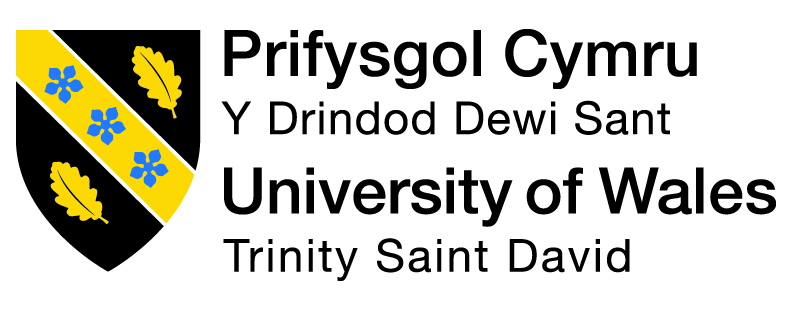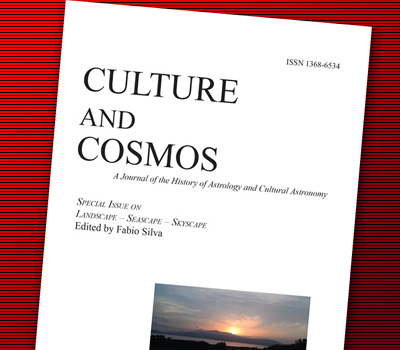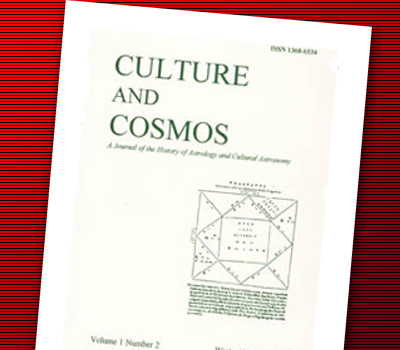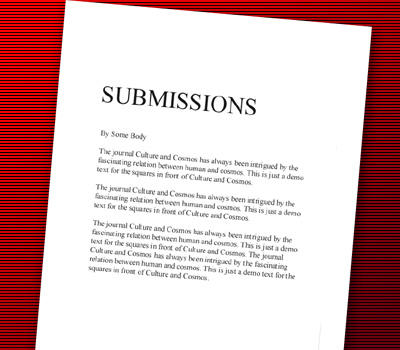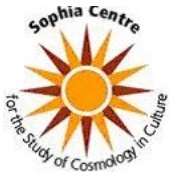We are currently seeking submissions for future volumes of Culture and Cosmos.
Volume 4, No. 2
Editorial
Nick Campion
The most recent issue of Alexandria, advertised in the last issue of Culture and Cosmos, is now available. Named after the location of the famous library, Alexandria's brief is to provide 'a meeting place for everyone who is interested in ancient and modern cosmological speculation'. Highlights of this issue include E.C. Krupp on 'Negotiating the Highwire of Heaven: The Milky Way and the Itinerary of the Soul', the transcript of his paper given at the first INSAP conference in June-July 1994.1 Krupp's statement that 'As transcendental territory, the sky is a destination for visionaries, shamans and the dead.
All require a route to heaven.' (p. 75) summarises in a few short words the religious impulse that has given us astral theology, astrology, sacred calendars and ultimately mathematical astronomy, and introduces the core theme that unites Alexandria's other contributions. David Fideler, the editor, contributes a paper on 'Science's Missing Half: Epistemological Pluralism and the Search for an Inclusive Cosmology', turning to the underlying psychological impulse which underpins Krupp's definition of the sky's numinous function: 'Wonder - the cosmological impulse - is the seed from which philosophy, science and religion emerge. As Socrates maintained, "Wonder is the beginning of all philosophy"' (p. 41). He concludes 'Truth is not handed to us ready-made on a platter, but the strength of our seeing lies with us.we cannot understand the universe without being changed, because the search for an integrated worldview necessitates our own transformation (p. 68).
Greg Whitlock turns to the earliest astronomy with his short piece on 'Teaching Archaeoastronomy' but concentrates on the discipline's modern implications: 'Science should have no ethnicity, no gender nor age. But saying that doesn't make it so. We need to work to create a multicultural context for science, to integrate it into the life of all people. One way is through archaeoastronomy' (p. 393). David Ulansey examines a specific religious application of astronomy in his paper on 'Mithras, the Hypercosmic Sun, and the Rockbirth'. Taking the paradoxical fact that Mithraic iconography represents Mithras and the sun god as distinct, but that in Mithraic inscriptions Mithras is often identified with the sun, as 'sol invictus', he argues that the Mithraists believed in the existence of 'two suns'. He finds literary evidence for this belief in the Platonic doctrine of two suns (particularly in the Chaldean Oracles) - one the astronomical sun, the other a 'hypercosmic' sun beyond the sphere of the fixed stars.
Moving into the modern world Jeffrey Raff writes on 'Jung and the Alchemical Imagination'. Raff, who studied with Jung's student Marie-Louise von Franz, reports that 'For von Franz, Jung's writings presented more than a psychological system, or a mode of analyzing others. For her, and for those of us studying with her, "living with the unconscious" was a way of life, and, in fact, a spiritual practice. We consulted our dreams and performed active imagination to learn to be in "in Tao" and to unite with the center of the psyche, the divine core that Jung named the self. Living with the self was a religious experience for us' (p. 209).
Altogether issue no 5 contains twenty-two papers spread over 471 pages at a price of $25.For details contact the publisher, Phanes Press, at PO Box 6114, Grand Rapids, Michigan 49516, USA, or http://www.cosmopolis.com.
1. For the INSAP conferences see http://www.insap.org

